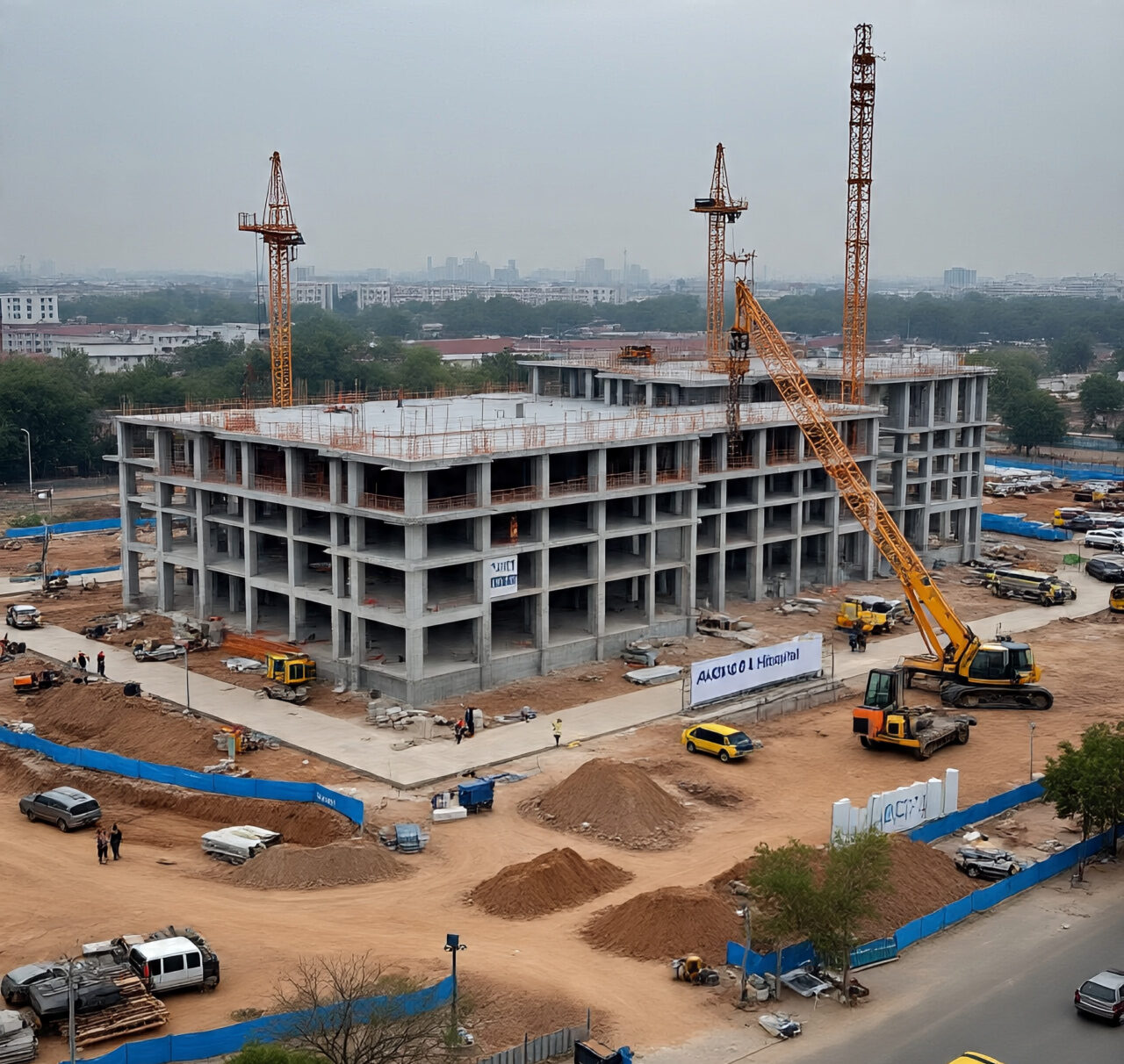
The Role of Biomedical Engineering in Modern Hospital Infrastructure
🏗️ Introduction to ACCO Construction
ACCO Construction is a trusted name in Pakistan’s construction and engineering industry, recognized for delivering innovative healthcare and hospital infrastructure solutions. Based in Lahore, ACCO has over two decades of experience in turnkey hospital design, construction, and engineering services, ensuring compliance with international healthcare standards.
Our multidisciplinary team — including architects, civil engineers, MEP experts, and biomedical engineers — collaborates to design facilities that are technologically advanced, safe, and patient-focused. From small diagnostic centers to large tertiary-care hospitals, ACCO Construction is known for blending medical technology and engineering excellence into every project.
🏥 Introduction to the Topic: The Importance of Biomedical Engineering in Modern Hospitals
In today’s era of advanced healthcare, biomedical engineering has become an essential component of hospital infrastructure design and management. Biomedical engineers bridge the gap between medicine and engineering, ensuring that medical equipment, systems, and technologies are properly integrated into hospital environments.
In Pakistan’s rapidly growing healthcare sector, hospitals are under increasing pressure to modernize their facilities to meet international standards and patient expectations. This evolution demands the integration of biomedical engineering principles into the design, construction, and operation of healthcare buildings.
By incorporating biomedical engineering expertise, hospitals can achieve:
Improved patient safety and care
Better equipment reliability and maintenance
Efficient space utilization and workflow optimization
Compliance with international healthcare regulations
⚙️ What Is Biomedical Engineering in Hospital Infrastructure?
Biomedical Engineering (BME) is a multidisciplinary field that applies engineering principles and design concepts to medicine and biology.
In hospital infrastructure, it focuses on:
Designing and integrating medical equipment systems
Managing hospital technology assets
Ensuring safety and compliance
Supporting maintenance and performance optimization
🔬 Key Areas of Biomedical Engineering in Hospitals:
Medical Equipment Planning and Procurement
Selecting, testing, and installing diagnostic and therapeutic devices.
Example: MRI machines, ventilators, X-ray systems, and infusion pumps.
Healthcare Technology Management
Maintaining and calibrating equipment to ensure accurate performance.
Infrastructure Integration
Coordinating electrical, mechanical, and gas systems to support medical devices.
Clinical Engineering
Training staff and ensuring safe usage of medical technologies.
Safety & Compliance
Meeting international standards like ISO 13485, IEC 60601, and WHO hospital design guidelines.
🧠 How Biomedical Engineering Enhances Hospital Design and Construction
1. Equipment-Centric Space Planning
Biomedical engineers collaborate with architects and interior designers to ensure spatial layouts accommodate advanced medical technologies without compromising safety or workflow.
Example:
MRI suites require specialized shielding and controlled environments to prevent magnetic interference.
2. Integration with MEP Systems
Biomedical engineers ensure seamless coordination between:
Electrical systems (power supply, backup, grounding)
Mechanical systems (HVAC, air pressure zones)
Pneumatic systems (medical gases, vacuum lines)
This ensures that medical devices operate safely and efficiently.
3. Technology Infrastructure
Modern hospitals depend on IT networks for:
Patient monitoring systems
Electronic Health Records (EHR)
Telemedicine platforms
Biomedical engineers design these systems to ensure connectivity, security, and reliability.
4. Sustainability & Efficiency
Biomedical planning also includes energy-efficient systems, low-maintenance devices, and smart automation to reduce operating costs while maintaining patient safety.
📊 Comparison Table: Traditional vs. Biomedical-Integrated Hospital Design
| Feature | Traditional Design | Biomedical-Integrated Design |
|---|---|---|
| Equipment Planning | Done after construction | Integrated during design stage |
| Maintenance | Reactive | Preventive and proactive |
| Workflow Efficiency | Often disrupted | Smooth and optimized |
| Technology Upgradation | Difficult and costly | Flexible and modular |
| Compliance | Basic safety only | International medical standards |
🧩 Applications of Biomedical Engineering in Modern Hospital Infrastructure
🏥 1. Operation Theatres (OT)
Integration of surgical lights, anesthesia systems, and imaging tools.
Controlled environment with HEPA filtration and temperature regulation.
💉 2. Intensive Care Units (ICU)
Bedside monitoring systems connected to central stations.
Biomedical layout ensures minimal cable clutter and maximum accessibility.
🧪 3. Diagnostic Laboratories
Equipment alignment for efficient sample flow.
Calibration and maintenance schedules managed via biomedical software.
🩻 4. Radiology Departments
Shielded rooms, controlled lighting, and temperature-sensitive equipment.
🏠 5. Outpatient & Emergency Units
Rapid-access diagnostic devices, mobile trolleys, and automated patient tracking systems.
📈 Trends in Biomedical Engineering and Hospital Design (2025 and Beyond)
AI and Predictive Maintenance
Using AI to monitor equipment performance and prevent breakdowns.
Internet of Medical Things (IoMT)
Networked medical devices communicating in real time.
Robotics and Automation
Robotic surgery and automated medication dispensing systems.
Sustainable Healthcare Design
Green building materials and energy-efficient equipment.
Telemedicine Integration
Smart rooms designed for remote consultations and digital monitoring.
✅ Advantages of Integrating Biomedical Engineering
1. Enhanced Patient Care:
Accurate diagnostics and treatment through reliable equipment.
2. Improved Operational Efficiency:
Reduced downtime through predictive maintenance.
3. Cost Savings:
Efficient asset management lowers operational expenses.
4. Regulatory Compliance:
Meets standards of PEC, WHO, and Pakistan Health Ministry.
5. Sustainable Development:
Supports green healthcare and smart hospital design.
⚠️ Challenges / Disadvantages
⚙️ High initial investment for advanced systems
🧩 Need for specialized engineers and training
🕒 Longer design and approval timelines
💸 Cost of continuous calibration and certification
🏗️ ACCO Construction’s Approach to Biomedical Engineering Integration
At ACCO Construction, we believe modern hospitals must combine architecture with biomedical intelligence. Our process includes:
Early Collaboration:
Biomedical engineers work with architects during the conceptual design stage.Equipment Layout Planning:
Each department’s medical devices are mapped into 3D models for accuracy.Compliance and Standards:
We ensure adherence to WHO, IEC, ASHRAE, and PEC guidelines.Technology Commissioning:
Final testing, validation, and staff training before handover.Lifecycle Support:
Maintenance, calibration, and future upgrades managed through service contracts.
ACCO’s turnkey solutions combine civil, MEP, and biomedical engineering under one roof — delivering hospitals that are efficient, safe, and future-ready.
💬 Pros and Cons of Biomedical Engineering in Hospital Infrastructure
✅ Pros
Improves patient safety and clinical outcomes
Reduces long-term operational costs
Enables integration of smart technologies
Supports accreditation (JCI, ISO)
Extends equipment lifespan
❌ Cons
High initial investment
Requires skilled biomedical teams
Complex coordination with multiple departments
💡 FAQs About Biomedical Engineering in Hospitals
1. What is biomedical engineering in hospital design?
It is the application of engineering principles to integrate and manage medical equipment and technologies within hospital infrastructure.
2. Why is biomedical engineering important for hospitals in Pakistan?
It ensures hospitals meet global safety and performance standards while improving patient care and efficiency.
3. How does ACCO Construction use biomedical engineering?
ACCO integrates biomedical planning from the design phase, ensuring seamless coordination between architecture, MEP, and technology systems.
4. Can existing hospitals adopt biomedical upgrades?
Yes. Retrofitting and layout modifications can modernize old hospitals for better workflow and compliance.
5. Does ACCO offer biomedical consulting and equipment planning?
Yes, ACCO provides complete biomedical engineering consultancy, from design to implementation and maintenance.
🔗 Related Internal Links
🌐 External References
🏁 Final Verdict
Biomedical engineering is transforming hospital infrastructure in Pakistan, making healthcare safer, smarter, and more efficient. As technology continues to evolve, hospitals that adopt biomedical design integration will gain a competitive edge in patient care and operational efficiency.
ACCO Construction remains at the forefront of this innovation — blending engineering precision, medical functionality, and sustainable construction to deliver world-class hospital facilities.
📞 Call to Action
Looking to build or upgrade a modern hospital with biomedical engineering integration?
Partner with ACCO Construction — Pakistan’s leader in hospital design, construction, and engineering innovation.
📲 Contact ACCO today for a free consultation!
🌐 www.acco.com.pk
📧 info@acco.com.pk
📞 +92-322-8000190
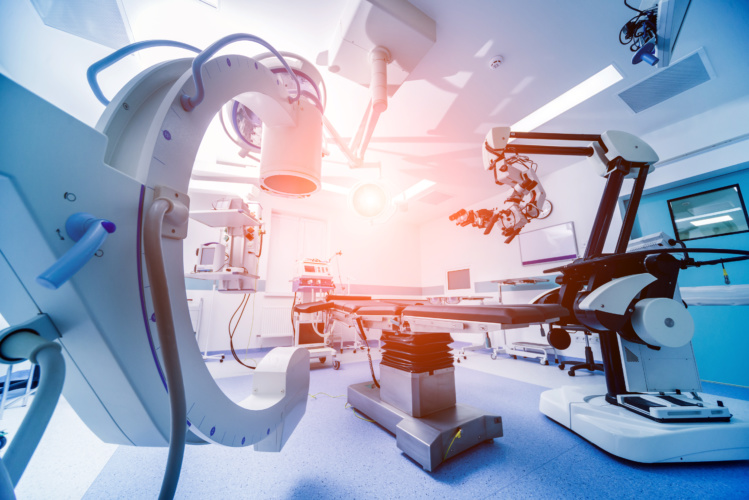
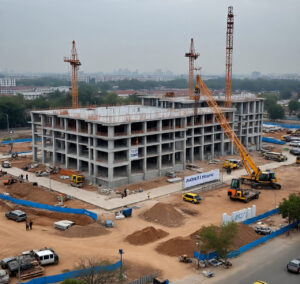
Turnkey Hospital Construction Solutions – From Design to Commissioning
🏗️ Introduction to ACCO Construction ACCO Construction is a leading name in Pakistan’s construction industry, specializing in hospital design, planning, and turnkey construction solutions. Based in Lahore, ACCO has over two decades of experience delivering healthcare infrastructure projects that meet

The Role of Biomedical Engineering in Modern Hospital Infrastructure
🏗️ Introduction to ACCO Construction ACCO Construction is a trusted name in Pakistan’s construction and engineering industry, recognized for delivering innovative healthcare and hospital infrastructure solutions. Based in Lahore, ACCO has over two decades of experience in turnkey hospital design,

Innovative Hospital Furniture and Equipment Layout for Better Workflow
🏗️ Introduction to ACCO Construction ACCO Construction is one of Pakistan’s leading construction and engineering companies, renowned for its healthcare infrastructure expertise. Based in Lahore, ACCO specializes in hospital design, turnkey construction, and medical interior planning. With decades of experience,

🏥 Hospital Interior Design Ideas for Improved Patient Experience | ACCO Construction
🏗️ Introduction to ACCO Construction ACCO Construction is one of Pakistan’s leading design and construction companies, renowned for delivering innovative and functional healthcare design solutions. Based in Lahore, ACCO has over two decades of experience in hospital design, interior planning,
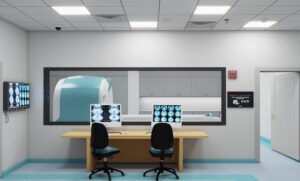
Designing Emergency Departments: Layouts that Save Lives
🏗 Introduction to ACCO Construction ACCO Construction is Pakistan’s trusted name in healthcare architecture, engineering, and turnkey hospital construction. Based in Lahore, ACCO has decades of experience designing and building modern medical facilities, from primary health centers to tertiary-care hospitals.

Efficient Space Planning in Hospitals Pakistan — Balancing Aesthetics & Functionality
Introduction to ACCO Construction ACCO Construction is a Lahore-based design & construction firm that specializes in healthcare facilities, commercial buildings, and high-quality residential projects across Pakistan. With years of experience delivering hospital layouts, modular wards, operation theatres, and turnkey healthcare

🏢 Turnkey Commercial Plaza Construction in Pakistan | ACCO Construction
Introduction to ACCO Construction ACCO Construction is a leading construction company in Lahore, Pakistan, recognized for its expertise in commercial, industrial, and residential projects. With over 20 years of experience, ACCO has successfully delivered modern commercial plazas, shopping centers, and

🏥 Efficient Space Planning in Hospitals: Balancing Aesthetics and Functionality
🏗️ Introduction to ACCO Construction ACCO Construction is one of Pakistan’s leading hospital design and construction experts, based in Lahore with over 20 years of experience delivering top-tier healthcare projects. We specialize in hospital architecture, interior design, MEP engineering, and
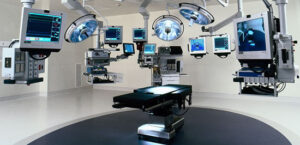
🏥 ICU and Operation Theatre Design Standards in Modern Hospitals | ACCO Construction
🏗️ Introduction to ACCO Construction ACCO Construction is a leading name in healthcare architecture, design, and construction in Pakistan, headquartered in Lahore. With over 20 years of experience, ACCO has successfully delivered projects ranging from multi-specialty hospitals, medical colleges, diagnostic

🏥 Sustainable Hospital Design: Green Building Solutions for Healthcare Facilities
(By ACCO Construction Pakistan) 🏗️ Introduction to ACCO Construction At ACCO Construction, we believe that architecture has the power to heal, inspire, and transform lives — especially in the healthcare sector. Based in Lahore, Pakistan, ACCO has been a leading

🏢 Commercial Plaza Architecture & Engineering Services in Pakistan | ACCO Construction
Introduction to ACCO Construction ACCO Construction is one of Pakistan’s leading design and build firms, headquartered in Gulberg-III, Lahore, specializing in architectural design, civil engineering, and turnkey construction solutions for commercial, residential, and industrial projects. With decades of experience in

🏥 Importance of Functional Design in Modern Hospitals and Clinics | ACCO Construction
Introduction to ACCO Construction ACCO Construction is one of Pakistan’s leading design and build firms, specializing in hospital architecture, healthcare infrastructure development, and turnkey medical facility construction. With decades of experience in Lahore, Islamabad, and across Pakistan, ACCO has established

🏥 Hospital Architecture in Pakistan: From Concept to Complete Healthcare Solution
🏗️ Introduction – ACCO Construction: Pioneers in Healthcare Architecture ACCO Construction is a leading name in Pakistan’s construction and design industry, specializing in hospital architecture, healthcare facility design, and turnkey construction solutions. With over two decades of expertise and successful

🏥 Designing Patient-Centered Hospitals: Key Elements for Better Healing Spaces
🏗️ Introduction – ACCO Construction: Shaping the Future of Healthcare Design ACCO Construction is one of Pakistan’s most trusted names in hospital and healthcare infrastructure development. With decades of experience in architectural design, MEP, civil works, and turnkey healthcare projects,

🏗️ Smart Commercial Plaza Designs with Modern Features in Pakistan | ACCO Construction
🏢 Introduction to ACCO Construction ACCO Construction, headquartered in Gulberg-III, Lahore, is one of Pakistan’s leading design and build companies specializing in commercial, residential, and industrial construction. With over 20 years of experience, ACCO has delivered state-of-the-art projects across DHA

🏥 Hospital Architecture in Pakistan: From Concept to Complete Healthcare Solution
🏗️ Introduction to ACCO Construction ACCO Construction is one of Pakistan’s leading construction and architectural design firms, recognized for delivering innovative, functional, and sustainable projects across the country. Based in Lahore, ACCO specializes in hospital architecture, healthcare facility planning, turnkey

🏥 Designing Patient-Centered Hospitals: Key Elements for Better Healing Spaces
🏗 Introduction to ACCO Construction ACCO Construction, a leading name in hospital design and construction in Lahore, has been transforming Pakistan’s healthcare infrastructure for years. Specializing in modern hospital architecture, interior design, and turnkey healthcare projects, ACCO brings together engineering

🏥 Top Trends in Hospital Interior Design for 2025: Comfort Meets Technology
🏗️ Introduction to ACCO Construction ACCO Construction is a leading design and build company based in Lahore, Pakistan, specializing in hospital architecture, interior design, and healthcare facility construction. With decades of experience in the construction industry, ACCO has successfully delivered

🏢 Luxury Commercial Plaza Construction Services | ACCO Construction
Introduction to ACCO Construction ACCO Construction is a leading name in Pakistan’s construction industry, recognized for delivering innovative, sustainable, and high-quality building solutions. Based in Gulberg-III, Lahore, ACCO has successfully completed numerous commercial, residential, and industrial projects across DHA Lahore,

🏥 Smart Healthcare Facility Design – Future of Hospital Architecture in Pakistan
ACCO Construction, based in Lahore, Pakistan, is one of the country’s leading names in architectural design, hospital construction, and turnkey healthcare infrastructure development. With over two decades of experience in smart, sustainable, and technology-driven construction, ACCO specializes in creating modern
Biomedical engineering in hospitals
Modern hospital infrastructure Pakistan
Hospital design and construction Lahore
Healthcare technology management
Biomedical systems integration
Hospital equipment layout design
Turnkey hospital engineering services
Smart hospital planning Pakistan
Hospital biomedical consulting
ACCO Construction healthcare projects
Hospital workflow and safety systems
Modern medical equipment management
Hospital engineering and technology services
Biomedical design and maintenance
Hospital MEP and biomedical coordination
Advanced healthcare facility design
Biomedical engineers in Pakistan
Hospital construction experts Lahore
Innovative hospital infrastructure
Biomedical engineering consultancy Pakistan

